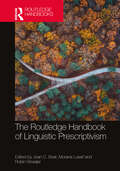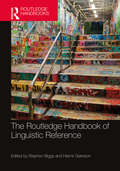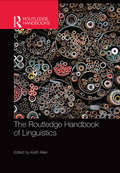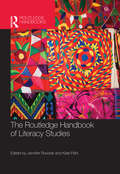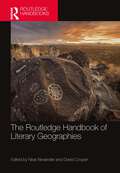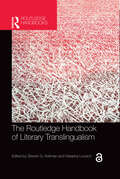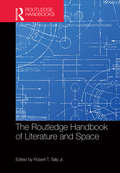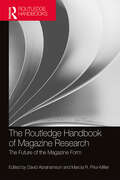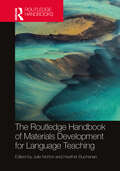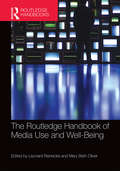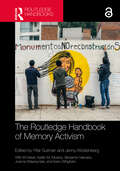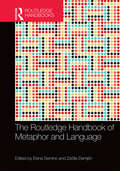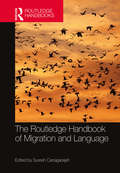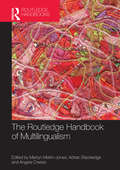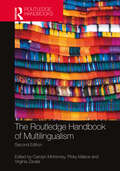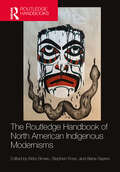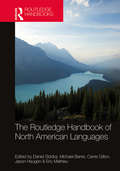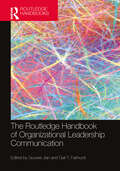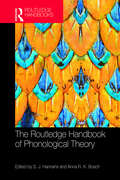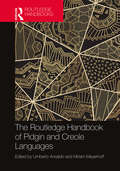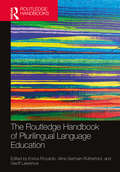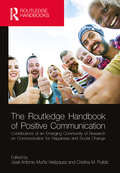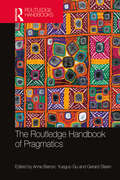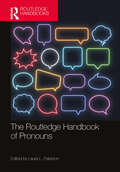- Table View
- List View
The Routledge Handbook of Linguistic Prescriptivism (Routledge Handbooks in Linguistics)
by Joan C. Beal Morana Lukač Robin StraaijerThis Handbook provides a comprehensive and cutting-edge overview of the field of linguistic prescriptivism. Mapping the current status quo of the field and marking its two-decade transformation into a serious field of study within linguistics, this volume addresses both the value and the methods of studying prescriptivism. It covers: • Theoretical and methodological approaches – from historical to experimental approaches and including corpus-based methods and attitudes research; • Contexts in which prescriptive efforts can be both observed and studied – including education, technology, the media, language planning and policies, and everyday grassroots practices; • Geographical contexts of prescriptivism – featuring chapters on inner- and outer-circle Englishes, English as a Lingua Franca, as well as prescriptivism in the context of other world languages including minority and endangered languages. With contributions from an international line-up of leading and rising-star scholars in the field, The Routledge Handbook of Linguistic Prescriptivism marks the evolution of linguistics as a fully self- aware discipline and will be an indispensable guide for students and researchers in this area.
The Routledge Handbook of Linguistic Reference (Routledge Handbooks in Philosophy)
by Stephen BiggsThis Handbook offers students and more advanced readers a valuable resource for understanding linguistic reference; the relation between an expression (word, phrase, sentence) and what that expression is about. The volume’s forty-one original chapters, written by many of today’s leading philosophers of language, are organized into ten parts:I Early Descriptive TheoriesII Causal Theories of ReferenceIII Causal Theories and Cognitive SignificanceIV Alternate TheoriesV Two-Dimensional SemanticsVI Natural Kind Terms and RigidityVII The Empty CaseVIII Singular (De Re) ThoughtsIX IndexicalsX Epistemology of Reference Contributions consider what kinds of expressions actually refer (names, general terms, indexicals, empty terms, sentences), what referring expressions refer to, what makes an expression refer to whatever it does, connections between meaning and reference, and how we know facts about reference. Many contributions also develop connections between linguistic reference and issues in metaphysics, epistemology, philosophy of mind, and philosophy of science.
The Routledge Handbook of Linguistics (Routledge Handbooks in Linguistics)
by Keith AllanThe Routledge Handbook of Linguistics offers a comprehensive introduction and reference point to the discipline of linguistics. This wide-ranging survey of the field brings together a range of perspectives, covering all the key areas of linguistics and drawing on interdisciplinary research in subjects such as anthropology, psychology and sociology. The 36 chapters, written by specialists from around the world, provide: an overview of each topic; an introduction to current hypotheses and issues; future trajectories; suggestions for further reading. With extensive coverage of both theoretical and applied linguistic topics, The Routledge Handbook of Linguistics is an indispensable resource for students and researchers working in this area.
The Routledge Handbook of Literacy Studies (Routledge Handbooks in Applied Linguistics)
by Jennifer Rowsell Kate PahlThe Routledge Handbook of Literacy Studies offers a comprehensive view of the field of language and literacy studies. With forty-three chapters reflecting new research from leading scholars in the field, the handbook pushes at the boundaries of existing fields and combines with related fields and disciplines to develop a lens on contemporary scholarship and emergent fields of inquiry. The Handbook is divided into eight sections: The foundations of literacy studies Space-focused approaches Time-focused approaches Multimodal approaches Digital approaches Hermeneutic approaches Making meaning from the everyday Co-constructing literacies with communities This is the first handbook of literacy studies to recognise new trends and evolving trajectories together with a focus on radical epistemologies of literacy. The Routledge Handbook of Literacy Studies is an essential reference for undergraduate and postgraduate students and those researching and working in the areas of applied linguistics and language and literacy.
The Routledge Handbook of Literary Geographies (Routledge Literature Handbooks)
by David Cooper Neal AlexanderThe Routledge Handbook of Literary Geographies provides a comprehensive overview of recent research and a range of innovative ways of thinking literature and geography together. It maps the history of literary geography and identifies key developments and debates in the field.Written by leading and emerging scholars from around the world, the 38 chapters are organised into six themed sections, which consider: differing critical methodologies; keywords and concepts; literary geography in the light of literary history; a variety of places, spaces, and landforms; the significance of literary forms and genres; and the role of literary geographies beyond the academy. Presenting the work of scholars from different disciplinary backgrounds, each section offers readers new angles from which to view the convergence of literary creativity and geographical thought. Collectively, the contributors also address some of the major issues of our time including the climate emergency, movement and migration, and the politics of place.Literary geography is a dynamic interdisciplinary field dedicated to exploring the complex relationships between geography and literature. This cutting-edge collection will be an essential resource for undergraduate and postgraduate students in both Geography and Literary Studies, and scholars interested in the evolving interface between the two disciplines.
The Routledge Handbook of Literary Translingualism (Routledge Literature Handbooks)
by Steven G. KellmanThough it might seem as modern as Samuel Beckett, Joseph Conrad, and Vladimir Nabokov, translingual writing - texts by authors using more than one language or a language other than their primary one - has an ancient pedigree. The Routledge Handbook of Literary Translingualism aims to provide a comprehensive overview of translingual literature in a wide variety of languages throughout the world, from ancient to modern times. The volume includes sections on: translingual genres - with chapters on memoir, poetry, fiction, drama, and cinema ancient, medieval, and modern translingualism global perspectives - chapters overseeing European, African, and Asian languages. Combining chapters from lead specialists in the field, this volume will be of interest to scholars, graduate students, and advanced undergraduates interested in investigating the vibrant area of translingual literature. Attracting scholars from a variety of disciplines, this interdisciplinary and pioneering Handbook will advance current scholarship of the permutations of languages among authors throughout time.
The Routledge Handbook of Literary Translingualism (Routledge Literature Handbooks)
by Steven G. KellmanThough it might seem as modern as Samuel Beckett, Joseph Conrad, and Vladimir Nabokov, translingual writing - texts by authors using more than one language or a language other than their primary one - has an ancient pedigree. The Routledge Handbook of Literary Translingualism aims to provide a comprehensive overview of translingual literature in a wide variety of languages throughout the world, from ancient to modern times.The volume includes sections on: translingual genres - with chapters on memoir, poetry, fiction, drama, and cinema ancient, medieval, and modern translingualism global perspectives - chapters overseeing European, African, and Asian languages Combining chapters from lead specialists in the field, this volume will be of interest to scholars, graduate students, and advanced undergraduates interested in investigating the vibrant area of translingual literature. Attracting scholars from a variety of disciplines, this interdisciplinary and pioneering Handbook will advance current scholarship of the permutations of languages among authors throughout time.
The Routledge Handbook of Literature and Space (Routledge Literature Handbooks)
by Robert T. Tally Jr.The "spatial turn" in literary studies is transforming the way we think of the field. The Routledge Handbook of Literature and Space maps the key areas of spatiality within literary studies, offering a comprehensive overview but also pointing towards new and exciting directions of study. The interdisciplinary and global approach provides a thorough introduction and includes thirty-two essays on topics such as: Spatial theory and practice Critical methodologies Work sites Cities and the geography of urban experience Maps, territories, readings. The contributors to this volume demonstrate how a variety of romantic, realist, modernist, and postmodernist narratives represent the changing social spaces of their world, and of our own world system today.
The Routledge Handbook of Magazine Research: The Future of the Magazine Form (Routledge Media and Cultural Studies Handbooks)
by David Abrahamson and Marcia R. Prior-MillerScholarly engagement with the magazine form has, in the last two decades, produced a substantial amount of valuable research. Authored by leading academic authorities in the study of magazines, the chapters in The Routledge Handbook of Magazine Research not only create an architecture to organize and archive the developing field of magazine research, but also suggest new avenues of future investigation. Each of 33 chapters surveys the last 20 years of scholarship in its subject area, identifying the major research themes, theoretical developments and interpretive breakthroughs. Exploration of the digital challenges and opportunities which currently face the magazine world are woven throughout, offering readers a deeper understanding of the magazine form, as well as of the sociocultural realities it both mirrors and influences. The book includes six sections: -Methodologies and structures presents theories and models for magazine research in an evolving, global context. -Magazine publishing: the people and the work introduces the roles and practices of those involved in the editorial and business sides of magazine publishing. -Magazines as textual communication surveys the field of contemporary magazines across a range of theoretical perspectives, subjects, genre and format questions. -Magazines as visual communication explores cover design, photography, illustrations and interactivity. -Pedagogical and curricular perspectives offers insights on undergraduate and graduate teaching topics in magazine research. -The future of the magazine form speculates on the changing nature of magazine research via its environmental effects, audience, and transforming platforms.
The Routledge Handbook of Materials Development for Language Teaching (Routledge Handbooks in Applied Linguistics)
by Julie Norton and Heather BuchananThe Routledge Handbook of Materials Development for Language Teaching is the definitive resource for all working in this area of language and English language teaching. With 34 chapters authored by leading figures from around the world, the Handbook provides an historical overview of the development of language teaching materials, critical discussion of core issues, and an assessment of future directions. The contributions represent a range of different international contexts, providing insightful, state-of-the-art coverage of the field. Structured in nine sections, the Handbook covers: changes and developments in language teaching materials controversial issues in materials development research and materials development materials for language learning and skills development materials evaluation and adaptation materials for specific contexts materials development and technology developing materials for publication professional development and materials writing Demonstrating throughout the dynamic relationship between theory and practice, this accessible Handbook is essential reading for researchers, scholars, and students on MA programmes in ELT, TESOL, and applied linguistics.
The Routledge Handbook of Media Use and Well-Being: International Perspectives on Theory and Research on Positive Media Effects
by Mary Beth Oliver Leonard ReineckeThe Routledge Handbook of Media Use and Well-Being serves as the first international review of the current state of this fast-developing area of research. The volume provides a multifaceted perspective on the beneficial as well as the detrimental effects of media exposure on psychological health and well-being. As a "first-mover," it will define the field of media use and well-being and provide an essential resource for research and teaching in this area. The volume is structured along four central considerations: Processes presents concepts that provide a theoretical bridge between media use and well-being, such as psychological need satisfaction, recovery from stress and strain, self-presentation and self-enhancement, or parasocial interactions with media characters, providing a comprehensive understanding of the underlying processes that drive psychological health and well-being through media. Moderators examines both risk factors that promote negative effects on well-being and protective factors that foster positive media effects. Contexts bridges the gap between theory and "real life" by illustrating how media use can influence well-being and satisfaction in very different life domains, covering the full spectrum of everyday life by addressing the public, private, and work spheres. Audiences takes a look at the influence of life phases and life situations on the interplay of media use and well-being, questioning whether various user groups differ with regard to the effects of media exposure. Bringing together the expertise of outstanding international scholars from multiple disciplines, including communication, media psychology, social psychology, clinical psychology, and media education, this handbook sheds new light on the role of media in influencing and affecting emotions.
The Routledge Handbook of Memory Activism (Routledge History Handbooks)
by Yifat Gutman Jenny WüstenbergThis Handbook is the first systematic effort to map the fast-growing phenomenon of memory activism and to delineate a new field of research that lies at the intersection of memory and social movement studies. From Charlottesville to Cape Town, from Santiago to Sydney, we have recently witnessed protesters demanding that symbols of racist or colonial pasts be dismantled and that we talk about histories that have long been silenced. But such events are only the most visible instances of grassroots efforts to influence the meaning of the past in the present. Made up of more than 80 chapters that encapsulate the rich diversity of scholarship and practice of memory activism by assembling different disciplinary traditions, methodological approaches, and empirical evidence from across the globe, this Handbook establishes important questions and their theoretical implications arising from the social, political, and economic reality of memory activism. Memory activism is multi-faceted, takes place in a variety of settings, and has diverse outcomes – but it is always crucial to understanding the constitution and transformation of our societies, past and present. This volume will serve as a guide and establish new analytic frameworks for scholars, students, policymakers, journalists, and activists alike.
The Routledge Handbook of Metaphor and Language (Routledge Handbooks in Linguistics)
by Elena Semino Zsófia DemjénThe Routledge Handbook of Metaphor and Language provides a comprehensive overview of state-of-the-art interdisciplinary research on metaphor and language. Featuring 35 chapters written by leading scholars from around the world, the volume takes a broad view of the field of metaphor and language, and brings together diverse and distinct theoretical and applied perspectives to cover six key areas: Theoretical approaches to metaphor and language, covering Conceptual Metaphor Theory, Relevance Theory, Blending Theory and Dynamical Systems Theory; Methodological approaches to metaphor and language, discussing ways of identifying metaphors in verbal texts, images and gestures, as well as the use of corpus linguistics; Formal variation in patterns of metaphor use across text types, historical periods and languages; Functional variation of metaphor, in contexts including educational, commercial, scientific and political discourse, as well as online trolling; The applications of metaphor for problem solving, in business, education, healthcare and conflict situations; Language, metaphor, and cognitive development, examining the processing and comprehension of metaphors. The Routledge Handbook of Language and Metaphor is a must-have survey of this key field, and is essential reading for those interested in language and metaphor.
The Routledge Handbook of Migration and Language (Routledge Handbooks in Applied Linguistics)
by Suresh Canagarajah** Winner of AAAL Book Award 2020 ** **Shortlisted for the BAAL Book Prize 2018** The Routledge Handbook of Migration and Language is the first comprehensive survey of this area, exploring language and human mobility in today’s globalised world. This key reference brings together a range of interdisciplinary and multidisciplinary perspectives, drawing on subjects such as migration studies, geography, philosophy, sociology and anthropology. Featuring over 30 chapters written by leading experts from around the world, this book: Examines how basic constructs such as community, place, language, diversity, identity, nation-state, and social stratification are being retheorized in the context of human mobility; Analyses the impact of the ‘mobility turn’ on language use, including the parallel ‘multilingual turn’ and translanguaging; Discusses the migration of skilled and unskilled workers, different forms of displacement, and new superdiverse and diaspora communities; Explores new research orientations and methodologies, such as mobile and participatory research, multi-sited ethnography, and the mixing of research methods; Investigates the place of language in citizenship, educational policies, employment and social services. The Routledge Handbook of Migration and Language is essential reading for those with an interest in migration studies, language policy, sociolinguistic research and development studies.
The Routledge Handbook of Multilingualism (Routledge Handbooks in Applied Linguistics)
by Angela Creese Adrian Blackledge Edited by Marilyn Martin-JonesThe Routledge Handbook of Multilingualism provides a comprehensive survey of the field of multilingualism for a global readership, and an overview of the research which situates multilingualism in its social, cultural and political context. The handbook includes an introduction and five sections with thirty two chapters by leading international contributors. The introduction charts the changing landscape of social and ethnographic research on multilingualism (theory, methods and research sites) and it foregrounds key contemporary debates. Chapters are structured around sub-headings such as: early developments, key issues related to theory and method, new research directions. This handbook offers an authoritative guide to shifts over time in thinking about multilingualism as well as providing an overview of the range of contemporary themes, debates and research sites. The Routledge Handbook of Multilingualism is the ideal resource for postgraduate students of multilingualism, as well as those studying education and anthropology.
The Routledge Handbook of Multilingualism (Routledge Handbooks in Applied Linguistics)
by Virginia Zavala Carolyn McKinney Pinky MakoeThe Routledge Handbook of Multilingualism provides a comprehensive survey of the field of multilingualism for a global readership and an overview of the research which situates multilingualism in its social, cultural and political context. This fully revised edition not only updates several of the original chapters but introduces many new ones that enrich contemporary debates in the burgeoning field of multilingualism. With a decolonial perspective and including leading new and established contributors from different regions of the globe, the handbook offers a critical overview of the interdisciplinary field of multilingualism, providing a range of central themes, key debates and research sites for a global readership. Chapters address the profound epistemological and ontological challenges and shifts produced since the first edition in 2012. The handbook includes an introduction, five parts with 28 chapters and an afterword. The chapters are structured around sub-themes, such as Coloniality and Multilingualism, Concepts and Theories in Multilingualism, and Multilingualism and Education. This ground-breaking text is a crucial resource for researchers, scholars and postgraduate students interested in multilingualism from areas such as sociolinguistics, applied linguistics, anthropology and education.
The Routledge Handbook of North American Indigenous Modernisms (Routledge Literature Handbooks)
by Kirby BrownThe Routledge Handbook of North American Indigenous Modernisms provides a powerful suite of innovative contributions by both leading thinkers and emerging scholars in the field. Incorporating an international scope of essays, this volume reaches beyond traditional national or euroamerican boundaries to locate North American Indigenous modernities and modernisms in a hemispheric context. Covering key theoretical approaches and topics, this volume includes: Diverse explorations of Indigenous cultural and intellectual production in treatments of dance, poetry, vaudeville, autobiography, radio, cinema, and more. Investigation of how we think about Indigenous lives, literatures, and cultural productions in North America from the late nineteenth and early twentieth centuries. Surveys of critical geographies of Indigenous literary and cultural studies, including refocused and reframed exploration of the diverse cultures, knowledges, traditions, geographies, experiences, and formal innovations that inform Indigenous literary, intellectual, and cultural productions. The Routledge Handbook of North American Indigenous Modernisms presents fresh insight to modernist studies, acknowledging and reconciling the occluded histories of Indigenous erasure, and inviting both students and scholars to expand their understanding of the field.
The Routledge Handbook of North American Languages (Routledge Handbooks in Linguistics)
by Michael Barrie Daniel Siddiqi Carrie Gillon Jason Haugen Eric MathieuThe Routledge Handbook of North American Languages is a one-stop reference for linguists on those topics that come up the most frequently in the study of the languages of North America (including Mexico). This handbook compiles a list of contributors from across many different theories and at different stages of their careers, all of whom are well-known experts in North American languages. The volume comprises two distinct parts: the first surveys some of the phenomena most frequently discussed in the study of North American languages, and the second surveys some of the most frequently discussed language families of North America. The consistent goal of each contribution is to couch the content of the chapter in contemporary theory so that the information is maximally relevant and accessible for a wide range of audiences, including graduate students and young new scholars, and even senior scholars who are looking for a crash course in the topics. Empirically driven chapters provide fundamental knowledge needed to participate in contemporary theoretical discussions of these languages, making this handbook an indispensable resource for linguistics scholars.
The Routledge Handbook of Organizational Leadership Communication (Routledge Handbooks in Communication Studies)
by Gail T. Fairhurst Guowei JianThis handbook captures a rapidly developing body of scholarship to map out the terrain of leadership communication and stimulate interdisciplinary dialogue among leadership communication scholars for future research. The Routledge Handbook of Organizational Leadership Communication surveys various areas of leadership communication, critically assesses their development, and proposes guidance for future research. It begins by addressing prominent theories or emerging theoretical perspectives that help conceptualize leadership communication, ranging from collective leadership approaches and critical perspectives to theories of practice and communicative constitution of organization. The second section focuses on reviewing the latest research on leadership communication in various organizational contexts, such as work teams, hybrid and virtual work contexts, and interorganizational collaboration. Informed by diverse theoretical perspectives, chapters in the final section examine the practice of leadership communication in dealing with both common and novel organizing challenges and processes, for example, the formation and execution of organizational vision and strategies, the use of emerging media technologies, and organizational decision making.The handbook will be an indispensable resource for researchers and advanced students in leadership communication and leadership studies and practicing managers and consultants in leadership and communication training and development.
The Routledge Handbook of Phonological Theory (Routledge Handbooks in Linguistics)
by S. J. Hannahs Anna BoschThe Routledge Handbook of Phonological Theory provides a comprehensive overview of the major contemporary approaches to phonology. Phonology is frequently defined as the systematic organisation of the sounds of human language. For some, this includes aspects of both the surface phonetics together with systematic structural properties of the sound system; for others, phonology is seen as distinct from, and autonomous from, phonetics. The Routledge Handbook of Phonological Theory surveys the differing ways in which phonology is viewed, with a focus on current approaches to phonology. Divided into two parts, this handbook: covers major conceptual frameworks within phonology, including: rule-based phonology; Optimality Theory; Government Phonology; Dependency Phonology; and connectionist approaches to generative phonology; explores the central issue of the relationship between phonetics and phonology; features 23 chapters written by leading academics from around the world. The Routledge Handbook of Phonological Theory is an authoritative survey of this key field in linguistics, and is essential reading for students studying phonology.
The Routledge Handbook of Pidgin and Creole Languages (Routledge Handbooks in Linguistics)
by Umberto Ansaldo Miriam MeyerhoffThe Routledge Handbook of Pidgin and Creole Languages offers a state-of-the-art collection of original contributions in the area of Pidgin and Creole studies. Providing unique and equal coverage of nearly all parts of the world where such languages are found, as well as situating each area within a rich socio-historical context, this book presents fresh and diverse interdisciplinary perspectives from leading voices in the field. Divided into three sections, its analysis covers: Space and place – areal perspective on pidgin and creole languages Usage, function and power – sociolinguistic and artistic perspectives on pidgins and creoles, creoles as sociocultural phenomena Framing of the study of pidgin and creole languages – history of the field, interdisciplinary connections Demonstrating how fundamentally human and natural these communication systems are, how rich in expressive power and sophisticated in their complexity, The Routledge Handbook of Pidgin and Creole Languages is an essential reference for anyone with an interest in this area.
The Routledge Handbook of Plurilingual Language Education (Routledge Handbooks in Applied Linguistics)
by Enrica PiccardoThe Routledge Handbook of Plurilingual Language Education is the first comprehensive publication on plurilingualism, offering a multidimensional reflection on the nature, scope, and potential of plurilingualism in language education and society. Authored by a range of internationally recognized experts, the Handbook provides an overview of key perspectives on plurilingualism in a complementary range of fields. After a comprehensive introduction to the concept itself, 24 chapters are organized in six parts, each examining plurilingualism through a different lens. The Handbook spans historical, philosophical, and sociological dimensions, examines cognitive and neuroscientific implications, and the limitations of boundaries before moving to a pragmatic perspective: How is plurilingual language education developing in different contexts around the world? How can it contribute to language revitalization? How can it be expected to develop in education, digital spaces, and society as a whole? Written for an international audience, this handbook is an indispensable reference tool for scholars in education and applied linguistics, educators, graduate and post-graduate students, and policy makers.
The Routledge Handbook of Positive Communication: Contributions of an Emerging Community of Research on Communication for Happiness and Social Change (Routledge Handbooks in Communication Studies)
by José Antonio Muñiz Velázquez Cristina M. PulidoThe Routledge Handbook of Positive Communication forms a comprehensive reference point for cross-disciplinary approaches to understanding the central role of communication in the construction of hedonic and eudemonic happiness,or subjective and psychological well-being. Including contributions from internationally recognized authors in their respective fields, this reference uses as its focus five main scenarios where communication affects the life of individuals: mass and digital media, advertising and marketing communication, external and internal communication in companies and organizations, communication in education, and communication in daily life interactions.
The Routledge Handbook of Pragmatics (Routledge Handbooks in Applied Linguistics)
by Gerard Steen Anne Barron Yueguo GuThe Routledge Handbook of Pragmatics provides a state-of-the-art overview of the wide breadth of research in pragmatics. An introductory section outlines a brief history, the main issues and key approaches and perspectives in the field, followed by a thought-provoking introductory chapter on interdisciplinarity by Jacob L. Mey. A further thirty-eight chapters cover both traditional and newer areas of pragmatic research, divided into four sections: Methods and modalities Established fields Pragmatics across disciplines Applications of pragmatic research in today’s world. With accessible, refreshing descriptions and discussions, and with a look towards future directions, this Handbook is an essential resource for advanced undergraduates, postgraduates and researchers in pragmatics within English language and linguistics and communication studies.
The Routledge Handbook of Pronouns (Routledge Handbooks in Linguistics)
by Laura L. PatersonThis original volume provides the first state-of-the-art overview of research on pronouns in the 21st century. With its dedicated sections on grammar, history, and change, language learning/acquisition, cognition and comprehension, power, politics, and identity, The Routledge Handbook of Pronouns shows that contemporary interest in pronouns and gender represents just the tip of the iceberg. Led by Laura Paterson, a transdisciplinary collection of experts discuss the global history of different pronoun systems, synthesize the literature, and contextualize the salient issues and current debates shaping research on pronouns across different spheres and via different theoretical-methodological traditions. The Handbook is designed to encourage readers to engage with a range of perspectives from within and beyond their immediate areas of interest, with the ultimate aim of shaping the future trajectory of interdisciplinary, multiingual research on pronouns. Using data from multiple languages and engaging deeply with the social, cultural, political, technological, and psychological factors that can influence pronoun use, this innovative book will be an indispensable resource to scholars and advanced students of theoretical and applied linguistics, education, and the social and behavioural sciences.
